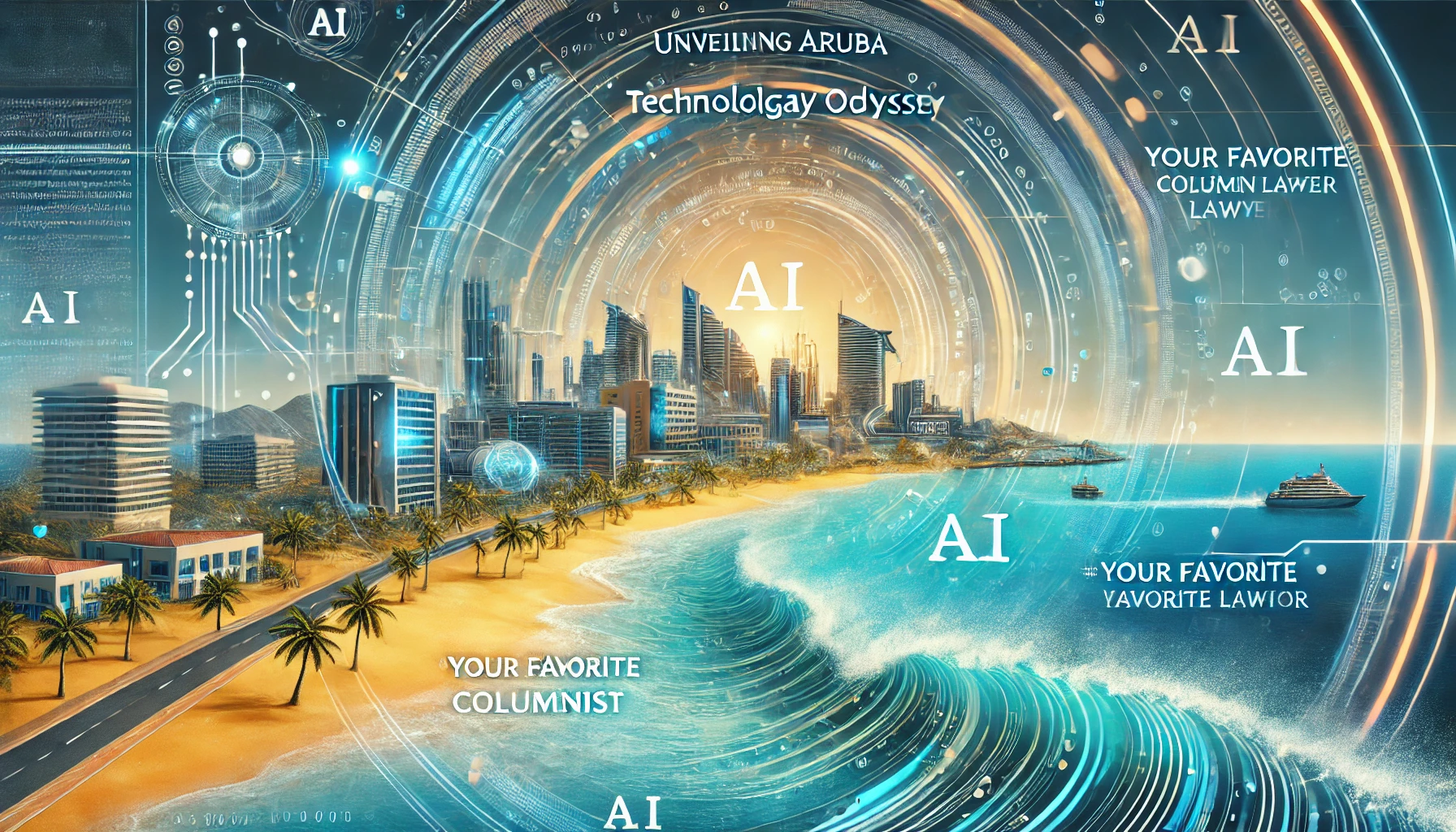Unveiling Aruba’s Technological Odyssey: Becoming “one AI Island”
A technological awakening is on the horizon in the sun-soaked paradise of Aruba, where azure waters meet sugar-white sands. Despite lagging in the fast-paced realm of technology and making meager investments in education, the introduction of Artificial Intelligence (AI) promises to propel our island forward by leaps and bounds. Could AI be the catalyst that catapults Aruba into a future that is not just a step ahead but a giant leap of 50 years in advancement in 2 years? The implications of this transformative shift are profound, signaling a potential revolution that could redefine the very fabric of Aruban society and economy.
My Weekend
Over the weekend, I was getting some household items at our local PriceSmart membership shopping club. While in line, I was mulling over my next column and considering doing a piece on AI. Then the cashier asked me for my membership card. I whipped out my membership card app and showed her the barcode. She scanned it, the system recognized me and my account, and I was good to go. Except she felt it necessary to ask me to show the physical card, which of course I don’t carry. The alternative was a picture, she said, which I had stored in my app, and then I was good to go. I could not help but roll my eyes in disbelief. I was just asked for a piece of paper or rather plastic to confirm that my barcode was legit. Meanwhile, aviation authorities around the globe, including in the EU, the USA, and Aruba, are using barcodes and QR codes to validate the legitimacy of pilot and crew licenses. I thought to myself, perhaps we are not ready yet to adopt the technology available today, let alone AI. Maybe I am jumping the gun here, but read on and I will give you my take and my outlook on AI and how this can or will affect our lovely island and our livelihood.
Understanding AI and ChatGPT
Artificial Intelligence, or AI, refers to the simulation of human intelligence in machines. These machines are designed to think, learn, and perform tasks that typically require human intelligence, such as recognizing speech, making decisions, solving problems, and understanding natural language. AI is about creating machines that can perform tasks requiring human intelligence. ChatGPT is a sophisticated AI language model that excels in understanding and generating text, making it a valuable tool across various fields. For example, if you ask ChatGPT, “What is the capital of Aruba?” it will respond with “Oranjestad,” because it has learned this information during its training. My son asked ChatGPT who I was and got a long, detailed and up to date answer on who Lincoln (Dello) Gomez the lawyer from Aruba is.
Why is ChatGPT Useful?
ChatGPT is useful for many reasons. It can help with planning your next vacation by suggesting destinations and itineraries based on your preferences. In the healthcare sector, it assists doctors by analyzing medical records and suggesting potential diagnoses. For personal growth, it can recommend books, recipes, or even workout plans tailored to your interests.
Talking to it
We “talk” to ChatGPT by using “prompts.” Prompts are cues or instructions that you give ChatGPT to perform a certain task. To effectively “talk” to ChatGPT, strong reading and writing skills are essential. If you lack these skills, using ChatGPT might prove to be a challenge or much less effective. Just like having a good conversation with a person, communicating with ChatGPT requires understanding the context and framing your thoughts clearly.
First, reading helps you understand the topic or the flow of a conversation. This way, you can create prompts that are relevant and make sense, ensuring that ChatGPT’s responses align with what you need. Clear and precise prompts are crucial. Just like instructing an employee, when you read well, you can write straightforward and specific prompts. This gives ChatGPT the right information to generate accurate and meaningful responses. Effective communication with ChatGPT relies on your ability to write clearly. Reading improves your communication skills, helping you phrase your prompts so that the AI can easily interpret them, reducing the chances of misunderstandings or incorrect answers. Understanding the nuances of a topic through reading allows you to guide ChatGPT in providing tailored responses. This means the answers will be more relevant to your specific questions. Avoiding ambiguity is another key aspect. Reading helps you craft prompts that are clear and unambiguous, making it easier for ChatGPT to understand your intent and respond appropriately. Good prompts also keep the conversation engaging. By understanding your needs and preferences through reading, you can anticipate what you want to ask and create prompts that keep the dialogue flowing smoothly.
Breaking it Down
If you are versed in AI, then I haven’t told you anything new. If my explanation totally went over your head, let me try a simplified version. AI is like a super smart robot brain that can do things people do, like talking and answering questions. ChatGPT is a special kind of AI that knows how to have conversations. It’s like having a very clever friend who can talk about anything you ask. If you ask it to tell you a story or answer a question, it will give you a good answer because it has learned a lot from reading many books and articles.
So What?
Well, this all might be fine and dandy, you say, but what does it mean for me? How can it help us? And of course, for the doomsday thinkers, will it take over the world? You may also ask where this is coming from.
Baby ChatGPT
ChatGPT was first released by OpenAI in November 2022. This version was called ChatGPT-3.5. The technology behind ChatGPT has been evolving for several years, with earlier versions being part of the broader GPT-3 family, which was initially introduced in June 2020. November 2022 is when I was really introduced to ChatGPT (Version 3.5). Since then, it has changed the world for many. Software development companies in India that supported software developers globally saw massive drops in work and revenue. Rather than queuing customers, they were now calling existing clients begging for work. Companies that had been working on AI projects suddenly found themselves out of business. Marketing agencies and graphic designers found themselves wondering what happened to their clients. AI was passing medical and law bar exams at a higher rate than mere humans who spend years and big dollars attending medical and law schools and preparing for the infamous board exams. All of this in less than 12 months after November 2022 while ChatGPT was a mere infant learning to walk. Fast forward to 2024, ChatGPT went to version 4.0 and is now at 4.0. While other “robots”, large language models (LLMs) like BERT and the UAE’s Falcon, are all on the bandwagon and speeding down the road to an incredible future. I have spent quite a bit of time, but certainly not enough, trying to grasp the basics of and various applications of AI. It has been eye-opening, daunting, exciting, scary, and at times even unbelievable. Applications are being launched, enhanced, and going from good to great in the blink of an eye.
Speed
If you are a speed junkie, the speed of exponential development will give you chills. Humanity has gone through various stages of development over the years. The speed of AI development today is akin to the rapid advancements seen during the Industrial Revolution and the Digitalization era. Just as the Industrial Revolution transformed manual labor with machinery and the digital revolution ushered in an era of unprecedented information accessibility and connectivity, AI is now accelerating at a breakneck pace, reshaping industries and everyday life. Innovations in AI are progressing exponentially, with breakthroughs occurring in months rather than decades and years. This rapid development parallels how steam engines and later computers revolutionized productivity and communication, respectively, signaling a transformative shift in how we approach problem-solving, automation, and intelligent decision-making across all sectors.
AI Mastery
Just last weekend, I attended an AI Mastery seminar that lasted a whole weekend with world-class speakers. I was not alone; my lovely partner, my awesome sister and brother-in-law, and one of my sons also attended. We were all both baffled and inspired by the program. One of the statements that resonated with all of us was:
“In the next two years AI will trigger 50 years worth of development.”
Read that again! I believe the statement to be accurate or perhaps even understated. The implication is that unless we, and not just my family but we as a community, do not embrace AI, we will find ourselves in a big vacuum and decades behind. While AI in itself will not replace us, those who have embraced AI will replace us or at least have a substantial edge over us. These pioneers will be able to accomplish more, at a fraction of the cost, and much faster than the old guard can. Being the devil’s advocate, I have challenged AI in my field, and while I still believe in my unique skills and human touch, I simply can’t process vast amounts of information as fast as AI can. My only option is to add AI to my toolkit.
Education
Where does this leave us and, in particular, our younger generations? As the glaring shortcomings of Aruba’s education system come into sharp focus, the advent of AI poses a pivotal question: is it not high time for a sweeping overhaul of our educational landscape? With AI poised to revolutionize the way we learn, work, and interact with the world, the urgency for a comprehensive reimagining of the educational infrastructure in Aruba becomes increasingly apparent. However, the looming concern remains: can we place our trust in Aruba’s government to spearhead this critical transformation, especially in light of past inadequacies and shortcomings? In a landscape marred by a history of lackluster performance, the prospect of entrusting the future of education to the same entities raises valid apprehensions about the efficacy and integrity of the intended reforms. Fact is that today our ministry of education, the leadership of our schools, and our teachers are not equipped to transfer AI knowledge and systems to our students. For now, it is up to us parents to encourage and enable our kids to submerge themselves in and embrace AI. In just a few months, I will complete homeschooling our two boys via online schools. A journey we embarked on and were forced to embark on during the pandemic. In this aspect, I give kudos to the local www.educampus.org initiative that enables our students to embrace online schooling.
Government Innovation
Our government formed a ministry of Innovation and even appointed a Chief Innovation Officer a few years back. This was a promising move. Delegations have visited Estonia and the Estonians have visited Aruba, yet the results and benefits of this initiative are not visible in our government’s services. We still do not have a Unique Identifier for our residents, which is a vital step towards implementing innovation. We still have a passport number, a driver’s license number, an ID number, a personal number, and an AZV number, and so on. This means none of these systems are ready to be integrated, and they are not AI-ready. This brings us back to the question: can we rely on our country’s leadership to make us “ONE AI ISLAND”?
Conclusion
The rapid development and implementation of AI technologies are poised to revolutionize societies, economies, and personal lives in unprecedented ways. Aruba, despite its current technological lag, stands on the brink of a potential transformation that could see it leapfrog into a future brimming with advancements. However, embracing this change requires a concerted effort from individuals, businesses, and the government to adapt and integrate these new technologies into every facet of life. Crucially, the ability to effectively utilize AI, such as ChatGPT, hinges on strong reading and writing skills. These skills are essential for crafting precise prompts, understanding AI responses, and ensuring clear communication. As we navigate this exciting and challenging journey, honing these fundamental skills will be vital.
Education plays a pivotal role in this transition. To prepare the next generation for a future dominated by AI, our educational system must undergo a comprehensive overhaul. It’s not just about teaching children how to use technology, but also about fostering critical thinking, problem-solving, and effective communication skills. Parents, educators, and policymakers need to work together to ensure that our young people are equipped with the necessary tools to thrive in an AI-driven world. With the right approach, a commitment to improving our reading and writing abilities, and a forward-thinking educational framework, the possibilities are boundless. AI holds the promise of a transformative future, and with proper preparation, Aruba can fully harness its potential.
#YourFavoriteColumnist #YourFavoriteLawyer #YourFavoriteAuthor #AI #ArtificialIntelligence #Aruba #FutureTech #EducationReform #ReadingAndWritingSkills #OneAiIsland #ChatGPT


















